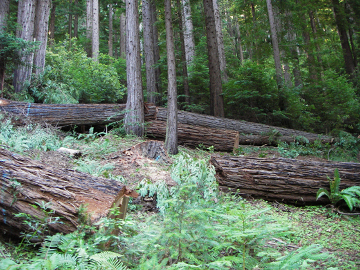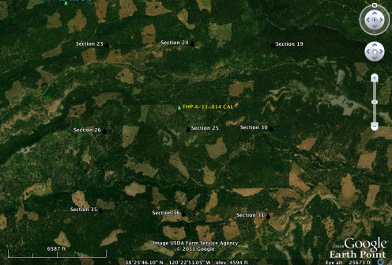Background on the EMC power grab
A.B. 1492 became law in 2012 and, among other things, provided a funding source through a tax on certain retail lumber products. This tax eliminated all fees for permits for logging under state law, placing the entire burden of paying for the regulatory process, as well as certain beneficial restoration and fire prevention activities, on the taxpayers.

The law also provided for ostensible broad oversight for the regulatory process by a partnership of the state Natural Resources Agency and CalEPA-- and hired staff to facilitate that oversight.
What has actually happened is that an industry/agency coalition, under a state Board of Forestry Committee, is trying to snatch away the opportunity for instituting long-overdue forestry reforms!
These reforms should include the proper assessment of cumulative watershed impacts, facilitation of ecosystem recovery measures, and the organization and easy accessibility of basic watershed and forest information - for use by all stakeholders, from environmental advocates to government regulators to timberland owners.
The state Board of Forestry (BOF) has set up the impressive-sounding "Effectiveness Monitoring Committee" to be the controller of the whole process. The EMC is closely modeled on an example in the State of Washington that has essentially sidelined the public and proponents for public trust values from playing a meaningful part in bringing about positive changes and improving logging practices.
We must take action immediately to stop this travesty and demand that a process be set up that is independent of undue influence by the industry. This process must be multidisciplinary and involve a true diversity of stakeholders.

We need to make sure that the public is fully and effectively represented - and that the whole process is transparent.
Ground-based Foundational Pilot Projects are an integral part of this reform process - and are needed first to determine actual conditions in a variety of types of forested watersheds in California.
The Foundational Pilots also need to determine the minimum acceptable types, standards, and formats of information that are necessary in logging plans so that cumulative impacts can be responded to, recovery and restoration measures can be taken, and simple, doable monitoring can occur.
This information needs to be easily accessible on a watershed basis and useful to all interested parties in the conservation and protection of forestland resources in California.
California must start again to develop an appropriate plan, built with input from all stakeholders, to develop performance standards for efficiently regulating logging and its environmental impacts.
Failure to properly assess and regulate "cumulative watershed effects" from logging has for some 40 years stood as the most glaring loophole in California's forestry laws. This shortcoming has drawn blistering criticism not only from environmentalists but also from federal wildlife agencies, blue-ribbon science panels, and good-government watchdog groups.
This failure has contributed to the decline of the state's salmon and steelhead fisheries, as well as to air and water pollution, degraded wildlife habitat and recreation values, increased wildfire danger, and many other costly problems.

But every time an effort has been mounted to address the problem, Big Timber and its allies in the California Dept. of Forestry and BOF have managed to wrest control of the process and render the result weak and riddled with loopholes - little different than what had come before!
The real solution: Foundational-- or groundwork-laying-- pilot projects-forestland Planning Watershed tracts set up in one or more different California forest ecosystems-in which the data concerning logging's impacts and forest restoration techniques alike can be gathered, evaluated, and refined.
Stream temperatures, canopy cover, siltation and erosion, damage to wildlife habitat.... These and other parameters can be examined in dedicated pilot projects and, through a process involving transparency and true public participation, the most- efficient scientific techniques and methodologies to understand and regulate these impacts can be developed, standardized and later applied.
If the current industry-favored EMC approach is adopted, A.B. 1492's funds would likely not be used to fund open, transparent pilot projects to achieve overdue reform! Instead, cumulative impacts, recovery opportunities, and simple, doable monitoring protocols will continue to be ignored. In addition, all new rules would emanate from the deliberations of this literally or figuratively closed-door high-level BOF committee!
The EMC offers nothing more than a process that would shut out the public - a process in which officials tilted toward industry, chosen largely on the basis of their "consensus ability and industry experience," write rules that their pals in Big Timber will like-rules developed without unwanted interference from independent advocates or the public.
We regard it as the Effectiveness Mitigating Committee. By any other name it is a betrayal of the promise of AB 1492, an attempt to hijack its funding and divert it away from real environmental change!
Help us stop the so-called Effectiveness Monitoring Committee from diverting funding and attention away from real environmental reforms! True environmental safeguards can best be developed in the sunlight of open, publicly vetted pilot projects!
We are tired of empty promises. Forty years of inaction on watershed-scale pollution and degradation is long enough! Help us close this new critical forest-protection loophole!
Please make a generous donation today!
![]()
via PayPal (more info)
©2025 Forests Forever. All Rights Reserved.